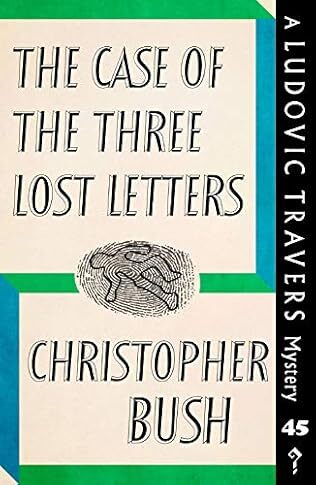The Case Of The Three Lost Letters

A review of The Case of the Three Lost Letters by Christopher Bush – 241112
The forty-fifth novel in Bush’s long-running Ludovic Travers series, originally published in 1954 and reissued by Dean Street Press, sees his gentleman sleuth, as owner of the Broad Street Detective Agency take on an unusual request. Citing indisposition Henry Baldlow requests that Travers visit him on a matter of extreme urgency. He is going to move to South Africa in a couple of weeks’ time but in the interim he is fearful for his life and would like a member of the agency to act as his bodyguard.
Travers reluctantly accepts the commission and dispatches one of his staff, Nordon, an ex-Commando and Intelligence officer who is still struggling to find his feet in civvy street to fulfil commission. Nordon appears to fulfil his brief diligently, sending daily reports which give some background to Baldlow and his family, a niece, Mrs Howell, a nephew, Tinley who is in the jewelry business, and a step-brother, Lorde, who is a solicitor.
Two seemingly unconnected events occur. On a Saturday afternoon Baldlow sends his domestic help, Mrs Carver, away for the afternoon, allegedly sends Nordon off to get a will form, takes a sleeping tablet, and is found dead. On that day each of his three relatives had been summoned to see Baldlow at a very specific time. None of the three visitors seemed aware that the others had been summoned too and each had destroyed the letters summoning them to the house, hence the book’s title. One of Travers’ other operatives, Luke Layman, is also found dead, having seemingly driven his car over a cliff while intoxicated. As is the way in a Bush novel, two seemingly disparate strands have a way of meeting at the end.
The obvious conclusions are that Baldlow was proposing to change his will and that he was going to confront each of his relatives with some uncomfortable facts which might lead to one or all of them being disinherited. Was this the reason for his death and if so, who killed him? In conducting his investigations, Travers has to dip his toe into the world of show business and smuggling and become entangled with a femme fatale who will not take no for an answer.
Bernice, Travers’ wife, is a little more present in her novel and it is she who is the catalyst for providing him with the information that sets him on the right path coupled with a shooting in a room in the Metropolitan Hotel. The truth lies closer to home and, although through a process of elimination and the odd clue dropped here and there the culprit can be identified and their motivation deduced, the resolution still comes as a bit of a surprise. This is a classic demonstration of Bush’s ability to weave a complex problem, maintain the tension with suspects coming in and out of the frame, and then cutting the Gordian knot with a clean, elegant solution.
An interesting feature of the novel is the influence that the Moral Re-armament aka the Oxford movement had on Baldlow’s behaviour and attitude towards his relatives. Founded in 1921 by Frank Buchman, the movement’s principal tenet being to “surrender one’s life over to God’s plan” by sharing with others how lives have been changed in pursuit of honesty, purity, unselfishness, and love. It had a big influence on groups such as Alcoholics Anonymous.
One theory Travers was working with was that Baldlow, having found out a guilty secret about each of his relatives, was going to request that they made a full confession at a MRA meeting in order for them to retain their legacy. And who cannot resist a member of the cloth with a name like Canon Orifice, one I shall remember for a long time.



